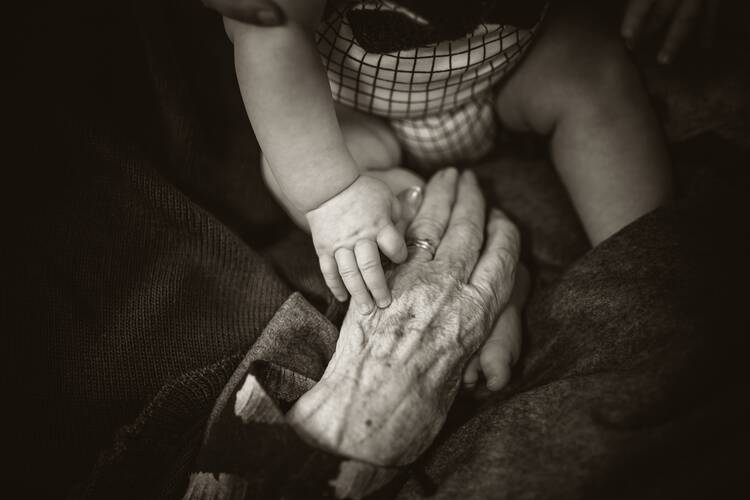A Reflection for the Nineteenth Sunday in Ordinary Time
1 Kings 19: 4-8 Ephesians 4: 30-5:2 John 6: 41-51
Anyone who has attended a high school reunion knows that we do not age equally. The years are kinder to some than to others. A mentor once told me that however young people might appear to be, their hands always reveal their age. Although anecdotal, it seems true enough to me.
Calloused, muscular and chafed hands certainly make clear who uses them to earn a living. It is no wonder that we refer to someone as a manual laborer, a word derived from manus, the Latin for hand.
As people come forward to receive Holy Communion, I first see their faces and then their hands. Both say a lot about who someone is. There are the first communicants, whose hands are so small. Some of them do not do a very good job holding their palms out flat, one hand resting upon the other. It is difficult to give them the host without being touched by their fingers.
The same is true of the aged, especially if one encounters them in a hospital bed. Move too quickly and they can easily drop the host. Sometimes it is easier for them to receive communion on the tongue than to use their hands, which often are connected to tubes.
Think of all the holy Communions that lie between those two sets of hands! The child and the older person, confined to bed. Hands put on baseball gloves and then wedding rings. They master crafts and skills. They hold infants and carry groceries. They learn to use a cane or walker for support. And through all the years, the same Lord Jesus comes into our hands as holy Communion.
We do not expect children to ponder the notion that their hands will grow old over time. We can look down at our own hands, but most of us will need to glance at the children to picture how our hands appeared the first time that we received holy Communion.
The Son of God entered time when he was born a man among us. He continues to travel through time, with us, by means of the Eucharist. We are quite right in calling it, “food for the journey.” Through the years, our hands age; the sacred host does not.
Christ is Lord of time. He holds the centuries in himself.
An unbeliever would want to point out that it is not the same host. Yet it is the same Lord. Through the mystery of this sacrament Jesus reveals something inherent about himself and about our life in him.
I am the living bread that came down from heaven;
whoever eats this bread will live forever;
and the bread that I will give is my flesh for the life of the world.
—Jn 6:51
We dwell in time. We travel through time. All our hopes and fears play out in time. But Christ is Lord of time. He holds the centuries in himself. One night, ages ago, he gave us the Eucharist, launched it like a vessel that would sail through time, carrying countless souls, including us, into the future, into his future.
The next time you receive holy Communion, ponder either of these two truths. One is about the past; the other, the future. Both will exceed what you can comprehend. The living Christ comes to you in the Eucharist. He travels through 2,000 years of time to reach you. And though you receive him into your hands, it is he who has come to take you into his hands, come to carry you home to a future you cannot imagine.









